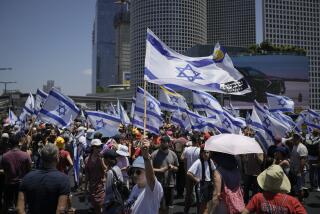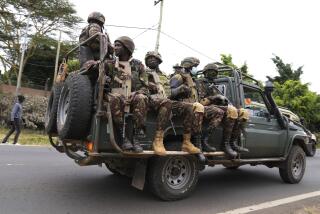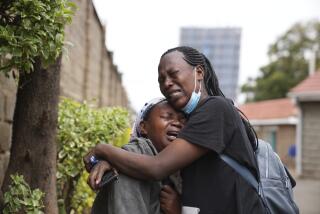Tear gas becomes the norm in Kosovo parliament as lawmakers protest Serbian ties
Lobbing tear gas canisters in parliament is an unorthodox protest method, but in Kosovo’s capital it’s become almost routine. For three months, opposition lawmakers have disrupted sessions of parliament with tear gas and whistles, and even by pelting the prime minister with eggs.
A lawmaker this week halted proceedings yet again by releasing tear gas. The session was moved to another room, only to be disrupted moments later by more acrid smoke.
The opposition is protesting a deal between Serbia and Kosovo to create an association of Serb-majority municipalities in Kosovo, and some lawmakers have vowed to continue disrupting parliament until the government suspends the agreement. The political crisis threatens to undermine the dialogue between the two countries. And it highlights how, 16 years after the Kosovo war and nearly eight years after its declaration of independence, Kosovo is still struggling to realize its goal of full-fledged statehood and international recognition.
NEWSLETTER: Get the day’s top headlines from Times Editor Davan Maharaj >>
Tear gas wasn’t the first choice of protest method for the nationalist party Vetevendosje, but it had no other choice because the government has refused to conduct an open and democratic debate about the deal, said Arber Zaimi, a political advisor to the party’s president.
“Basically we found ourselves excluded from the political process,” Zaimi said in an interview. “It’s despotic. It’s not democratic, and we will protest against this. They control the police and the judiciary, so they can do whatever they want.”
The August deal for the association of municipalities is part of a landmark 2013 agreement between Serbia and Kosovo to work toward normalization of relations. In 1998 and 1999, Serbia brutally suppressed an ethnic Albanian insurgency seeking independence for Kosovo. The conflict ended with a NATO bombing campaign that drove Serbian forces from the territory, and Kosovo declared independence in 2008.
But Serbia has refused to recognize Kosovo, keeping the new state from joining the United Nations and from becoming a candidate to join the European Union. At home, Kosovo is beset by extensive corruption and a high jobless rate and, in the last year, has lurched from one political crisis to another.
Vetevendosje is leading the protests, which are not confined to parliament. It has thrown paint on government buildings, blocked the prime minister’s vehicle and organized rallies that sometimes turn into clashes with police.
Vetevendosje, whose name means “self-determination,” has been critical of international intervention in Kosovo and of the dialogue with Serbia. The party says the association of municipalities will exacerbate ethnic divisions and will have enough power to threaten Kosovo’s sovereignty. With support from Serbia, the party says, the association will resemble a state within a state.
Zaimi said it would turn Kosovo into another Bosnia-Herzegovina, where ethnically divided entities have veto power over state-level actions, resulting in extreme dysfunction. The opposition is also protesting the government’s move to ask a team of international experts to demarcate Kosovo’s border with Montenegro.
After the opposition held a large protest last month, police in riot gear raided the party headquarters, arresting those inside. Recently, 13 lawmakers have been arrested and about a dozen activists have been jailed.
Arban Abrashi, minister of labor and social welfare and spokesman for the government, said the opposition is unreasonable. The government has offered to sit down with the opposition, but it refused, saying it would not talk with the government unless it suspends the agreement or calls a referendum or new elections.
“It’s the violence happening in the parliament that’s left no room for dialogue,” Abrashi said.
Implementation of the agreement is suspended by Kosovo’s high court while it considers whether the deal is constitutional. Abrashi said the opposition should wait for the court’s decision, and abide by it. The association, he said, would simply be “a platform where Serbian municipalities will have support for capacity building” in areas like planning and budgets.
Kosovo’s international allies have been highly critical of the protests. On a recent trip to Kosovo, Secretary of State John F. Kerry said parliament “is not a place for tear gas.”
Join the conversation on Facebook >>
Florian Bieber, director of the Center for Southeast European Studies at the University of Graz in Austria, said the role of international actors is part of the problem in Kosovo.
“There’s been a lot of kind of meddling into everyday politics by international actors, particularly by the U.S. Embassy,” he said in a phone interview. “I don’t doubt the intentions, but I think the results have been often to discredit the political system.” Instead of learning to compromise, he said, parties take maximalist positions because they expect the U.S. to intervene to end the standoff.
Some analysts see the crisis as a symptom of the fact that the dialogue with Serbia is going nowhere fast. Engaging with Serbia promised two rewards for Kosovo: integration of Serbs in Kosovo and the possibility of Kosovo membership in the EU, Besa Shahini, an independent analyst in Pristina, said via email.
“But after four years of dialogue, it has become clear that neither will happen,” she said. Kosovo cannot apply for EU membership because it is not recognized by some members, because of nonrecognition by Serbia. “And Serbia is not showing signs of ever recognizing Kosovo.”
Shahini criticized the opposition’s protest methods but said “they are being used in a context of an important political debate which absolutely must happen in Kosovo.”
Chick is a special correspondent.
MORE WORLD NEWS
Pentagon to send more weapons to Kurds fighting Islamic State
EU leaders scramble to save a signature achievement: Passport-free travel
San Bernardino shooter was a Pakistani who became known as a ‘Saudi girl’
More to Read
Sign up for Essential California
The most important California stories and recommendations in your inbox every morning.
You may occasionally receive promotional content from the Los Angeles Times.










